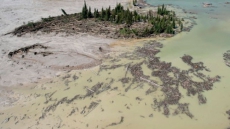ST. JOHN'S, N.L. — Scientific studies increasingly suggest marijuana may not be the risk-free high that teens — and sometimes their parents — think it is, researchers say.
Yet pot is still widely perceived by young smokers as relatively harmless, said Dr. Romina Mizrahi, director of the Focus on Youth Psychosis Prevention clinic and research program at the Centre for Addiction and Mental Health.
She cites a growing body of research that warns of significantly higher incidence of hallucinations, paranoia and the triggering of psychotic illness in adolescent users who are most predisposed.
"When you look at the studies in general, you can safely say that in those that are vulnerable, it doubles the risk."
Such fallout is increasingly evident in the 19-bed crisis monitoring unit at the Children's Hospital of Eastern Ontario in Ottawa.
"I see more and more cases of substance-induced psychosis," said Dr. Sinthu Suntharalingam, a child and adolescent psychiatrist. "The most common substance that's abused is cannabis."
One or two cases a week are now arriving on average.
"They will present with active hallucinations," Suntharalingam said. "Parents will be very scared. They don't know what's going on.
"They'll be seeing things, hearing things, sometimes they will try to self-harm or go after other people."
She and Mizrahi, an associate professor in psychiatry at University of Toronto, are among other front-line professionals who say more must be done to help kids understand potential effects.
"They know the hard drugs, what they can do," Suntharalingam said. "Acid, they'll tell us it can cause all these things so they stay away from it. But marijuana? They'll be: 'Oh, everybody does it.'"
Mizrahi said the message isn't getting through.
"Teenagers think that cannabis is harmless. It is not. And for some people, it's particularly dangerous."
She stressed that risk depends on many factors.
"Not every 14-year-old who smokes marijuana will have schizophrenia," she said in an interview.
Genetics, social issues, marijuana strength and frequency of use are among complex variables along with how young a person starts using the drug.
"We are starting to see this as a very important issue," Mizrahi said. "I think we have to start to talk about this."
Brain development in childhood continues through teenage years and into the early 20s, she explained. Cannabis affects how the brain's regulator — called the endocannabinoid system — controls things like mood and memory, she said.
"You're kind of tampering with or altering the system that's there to regulate other things."
Mizrahi said she typically gets feedback when she discusses this topic from people who say they've used marijuana for decades with no psychotic effect. There are also those who point out myriad medical benefits.
But psychotic episodes, when they occur, could be short-lived or trigger a longer-term illness.
The Centre for Addiction and Mental Health says marijuana use in Canada is most common among teens and young adults. It estimates past-year use in Ontario at 23 per cent for students in Grade 7 to 12, and 40 per cent for those aged 18 to 29.
Amir Englund of King's College London specializes in the effects of cannabis on the brain and behaviour. Pot with higher THC or tetrahydrocannabinol content, the ingredient that induces most psychological effects, can pack the punch of three shots of scotch versus a pint of beer, he said.
Studies of frequent adolescent users suggest those who start smoking earlier have a higher tendency to develop psychotic illnesses, he said in an interview.
"People who get an illness much earlier, their likelihood of having a bad prognosis is higher."
In Canada, pot is often more accessible to under-agers than alcohol but with no content controls. The Centre for Addiction and Mental Health, the country's largest teaching hospital of its kind, called last fall for legalization with strict regulation to reduce harm.
Mizrahi advises all young people to avoid pot until they're at least in their early 20s.
"Certainly don't do it when your brain is developing," she said. "Don't put yourself at risk."




